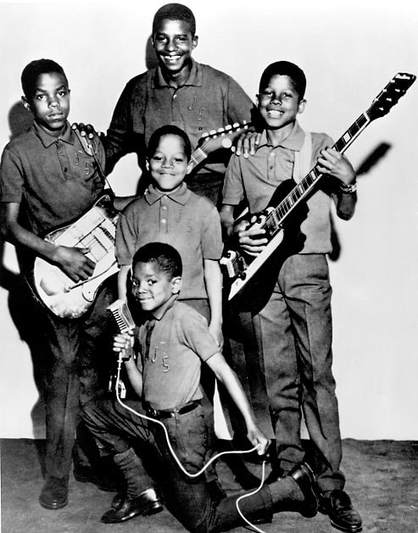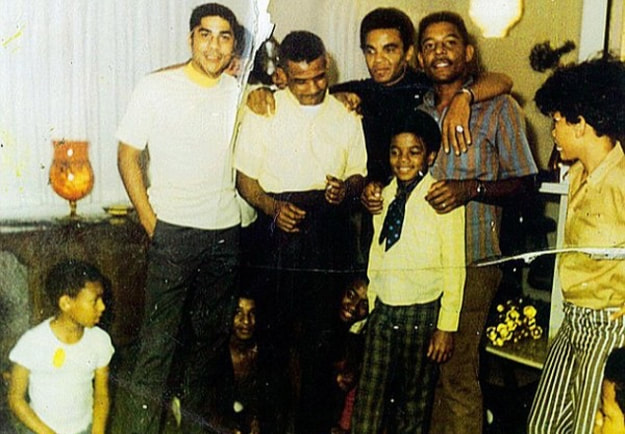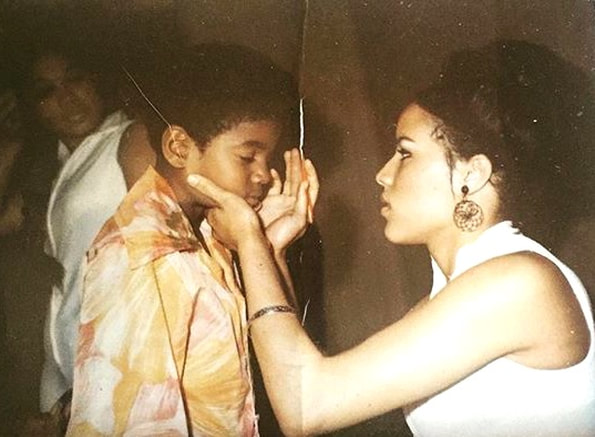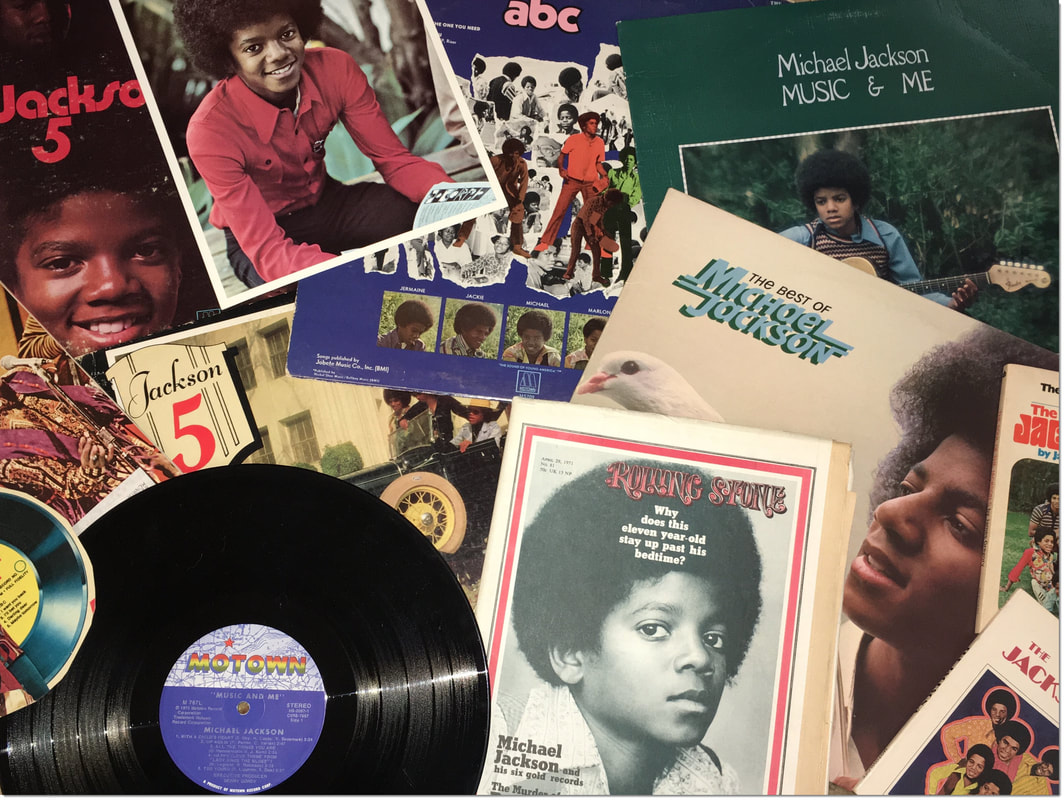Reeling Through the Years
JACKSON FIVE / J5 ERA: 1958-1975
"Just got the official word from Grandma, herself. Uncle Michael was born at 7:33 p.m., [August 29, 1958]." - Taj Jackson (Aug. 28, 2016)
It was appreciated, respected and cultivated long before Michael got on stage to sing "Climb Every Mountain." And above all, it was a true love for the entire family before the Jackson Five became a musical group.
Music was a passionate pastime for the Jacksons’ as a family, and that's where their dream began. However, this particular story started on Aug. 29, 1958 when Michael Joseph Jackson was born.
Some of the first documented Jackson music came from Joe's group The Falcons, which included his brother Luther. (Luther went on to assist Joe with managing the Jackson Five early on). After Tito’s instrumental abilities on his father’s guitar came to light, he, along with Jackie and Jermaine formed a trio. However, it wasn’t until Michael sang “Climb Every Mountain” at Garnett Elementary School in Gary, Ind., when he and Marlon completed the group.
After Joe discovered the talents of his five oldest sons, the legacy of their musical saga began. These five young brothers, with the help of their father, formed the Jackson Five, (spelled out "F.I.V.E."). From songs like "Barefootin'" and "Who's Lovin' You", to "Tobacco Road" and "You've Changed", the Jackson Five performed their way throughout different parts of the country, touring the Chitlin' Circuit. From the Regal Theater and the Apollo Theater, to radio stations in St. Louis, Philadelphia and beyond, the Jackson Five were mesmerizing crowds of all ages.
Music was a passionate pastime for the Jacksons’ as a family, and that's where their dream began. However, this particular story started on Aug. 29, 1958 when Michael Joseph Jackson was born.
Some of the first documented Jackson music came from Joe's group The Falcons, which included his brother Luther. (Luther went on to assist Joe with managing the Jackson Five early on). After Tito’s instrumental abilities on his father’s guitar came to light, he, along with Jackie and Jermaine formed a trio. However, it wasn’t until Michael sang “Climb Every Mountain” at Garnett Elementary School in Gary, Ind., when he and Marlon completed the group.
After Joe discovered the talents of his five oldest sons, the legacy of their musical saga began. These five young brothers, with the help of their father, formed the Jackson Five, (spelled out "F.I.V.E."). From songs like "Barefootin'" and "Who's Lovin' You", to "Tobacco Road" and "You've Changed", the Jackson Five performed their way throughout different parts of the country, touring the Chitlin' Circuit. From the Regal Theater and the Apollo Theater, to radio stations in St. Louis, Philadelphia and beyond, the Jackson Five were mesmerizing crowds of all ages.
|
In 1967 while appearing on the Apollo Theater, the Jackson Five, particularly Jermaine, Marlon and Michael, met kids around their age and together, formed a solid friendship. Between show sets, the group and their newfound friends played games like freeze tag and hide-and-seek outside of the Apollo. One of those friends, Antoinette Holmes, created the first official Jackson Five Fan Club in 1967.
"When I started the Jackson Five fan club, we hosted different parties at my friend's house, celebrating both the Jacksons and The Five Stairsteps,” said Holmes. “We also used to have our official Jackson Five fan club meetings at that same friend's house as well." In 1966, the Jackson Five recorded their song "Big Boy" on One-Derful Records. One year later, November of 1967, the group re-recorded their debut single "Big Boy" with Steeltown Records under the direction of Gordon Keith, and began selling the record by themselves to music-goers at their shows. “Big Boy” played throughout radio stations, giving the Jackson Five a positive, musical reputation, and was added to their performance set list. In 1968, Jackie, Michael, Marlon, Tito and Jermaine impressed Bobby Taylor of Bobby Taylor & the Vancouvers. Bobby, a legend in his own right, helped bring the Jackson Five to audition for Motown Records in Detroit, Mich. On July 26, 1968, the group was officially signed to Motown Records. Berry Gordy was more than excited about these five brothers from Gary, Ind. He was inspired and turned the Jackson Five into his newest project. For the group's debut album, he assigned Bobby the task of creating an explosion of hits for their release and together, he and the Jackson Five got to work. The five musical brothers were officially Motown's newest, hidden gem yet to be released, and it was Bobby's job to produce a sound that would not only welcome them to the music world, but kick the Jackson Five into overdrive. |
Photo taken in New York at a party celebrating the Jackson Five and The Five Stairsteps.
Copyright, unknown. Jenine Howard's Mother was touring with a group called The Lollipops and appeared at the Apollo Theater the same time the Jackson Five did. Michael Jackson walked into the dressing room and asked Jenine's mother if she could help him apply his stage makeup.
Copyright, Jenine Howard |
1969-1972
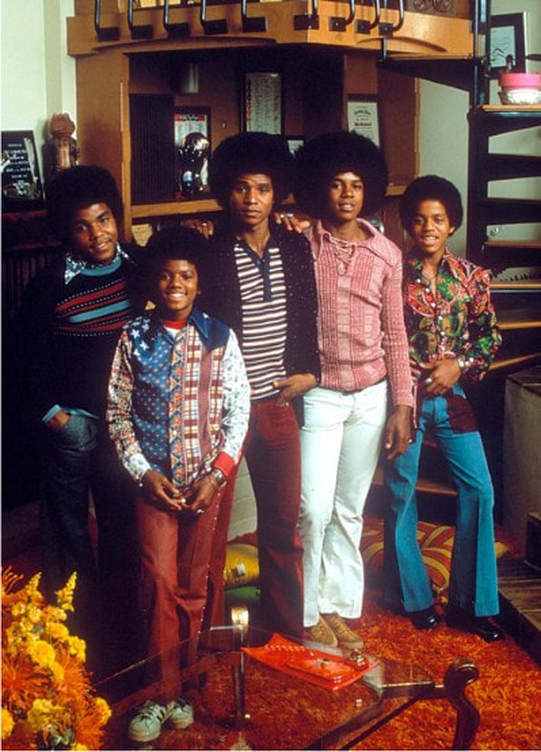 Archives (copyright unknown)
Archives (copyright unknown)
For the Jackson family, Dec. 18, 1968 was a regular Wednesday. One year later to the day (Dec. 18, 1969), Jackie, Tito, Jermaine, Marlon and Michael were household names across America, celebrating the release of their debut album, Diana Ross Presents the Jackson 5. Bobby and the group, (now the Jackson 5 - spelled with the number "5") recorded a lot of cover songs together. But, it was at the hands of Motown's writing team, The Corporation (Berry Gordy, Freddie Perren, Alphonso Mizell and Deke Richards), who gave the Jackson 5 "I Want You Back" - their debut, number one that released two months prior on Oct. 7, 1969.
Diana Ross Presents the Jackson 5 was a success, but it was their follow-up releases in 1970 that kicked the group up a notch, launching three more albums, along with three more number one hits:
1970 SINGLES:
"ABC" - released in the USA, Feb 24, 1970 (from ABC)
"The Love You Save" - released in the USA, May 13, 1970 (from ABC)
"I'll Be There" - released in the USA, August 28, 1970 (from Third Album) - One day before Michael's 12th birthday.
1970 ALBUMS:
ABC - released in the USA, May 8, 1970
Third Album - released in the USA, Sept. 8, 1970
Christmas Album - Oct. 15, 1970
In 1971, the J5 gave their fans a slew of new music, including their first live album, Goin' Back to Indiana. In addition to J5 pandemonium was the powerhouse breakout release by Michael with the launch of his debut solo single, "Got to Be There". Not only was the song a fan-favorite, it was an equal enjoyment shared between Michael and Motown Promotional Staff member, Chappy Johnson, who said, "Michael and I loved 'Got to Be There' and it was a great release for him. This was a big song, and he and I shared an inside joke with it! *Laughs*... We loved it."
When 1972 hit, fans saw the release of countless new Jackson-material, including Jermaine's release of his debut single "That's How Love Goes," featuring his brothers on the chorus. Other 1972 launches included Got the Be There and Ben - both new solo Michael Jackson albums. (If solo material wasn't enough, Motown released Lookin' Through the Windows by the Jackson 5 in 1972 as well).
By the fall of 1972, Motown had etched out a new release plan for Michael's song "Ben." "Ben" went on to become Michael's first solo number one hit in the U.S.
1973-1975
Diana Ross Presents the Jackson 5 was a success, but it was their follow-up releases in 1970 that kicked the group up a notch, launching three more albums, along with three more number one hits:
1970 SINGLES:
"ABC" - released in the USA, Feb 24, 1970 (from ABC)
"The Love You Save" - released in the USA, May 13, 1970 (from ABC)
"I'll Be There" - released in the USA, August 28, 1970 (from Third Album) - One day before Michael's 12th birthday.
1970 ALBUMS:
ABC - released in the USA, May 8, 1970
Third Album - released in the USA, Sept. 8, 1970
Christmas Album - Oct. 15, 1970
In 1971, the J5 gave their fans a slew of new music, including their first live album, Goin' Back to Indiana. In addition to J5 pandemonium was the powerhouse breakout release by Michael with the launch of his debut solo single, "Got to Be There". Not only was the song a fan-favorite, it was an equal enjoyment shared between Michael and Motown Promotional Staff member, Chappy Johnson, who said, "Michael and I loved 'Got to Be There' and it was a great release for him. This was a big song, and he and I shared an inside joke with it! *Laughs*... We loved it."
When 1972 hit, fans saw the release of countless new Jackson-material, including Jermaine's release of his debut single "That's How Love Goes," featuring his brothers on the chorus. Other 1972 launches included Got the Be There and Ben - both new solo Michael Jackson albums. (If solo material wasn't enough, Motown released Lookin' Through the Windows by the Jackson 5 in 1972 as well).
By the fall of 1972, Motown had etched out a new release plan for Michael's song "Ben." "Ben" went on to become Michael's first solo number one hit in the U.S.
1973-1975
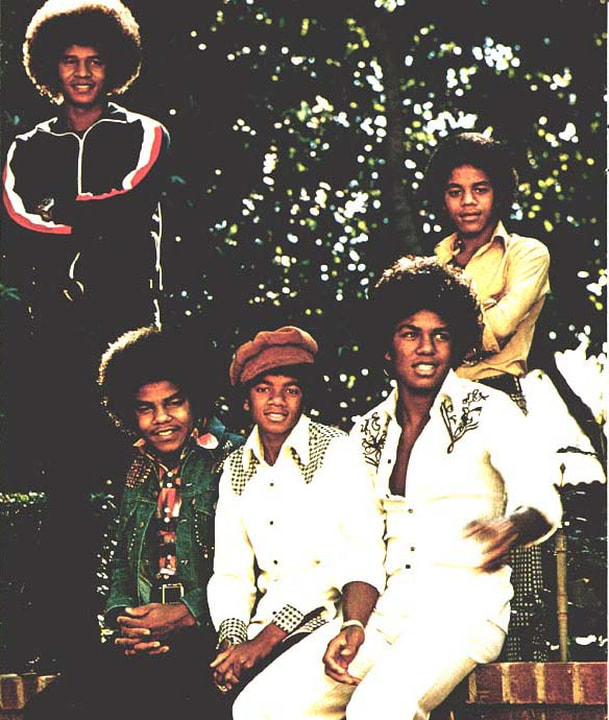 Archives (copyright unknown)
Archives (copyright unknown)
For Michael, 1973 was significant for more than the numerous singles and albums Motown put out by him and the Jackson 5. Michael's vocal tone was rapidly changing, giving fans a glimpse of what was to come with his artistic range.
On March 29, 1973, the Jackson 5's newest album Skywriter released, showcasing four singles: "Corner of the Sky" (Released Oct. 2, 1972), "Hallelujah Day" (Feb. 26, 1973), "Skywriter" (Aug. 24, 1973 in the U.K. only) and "The Boogie Man" (April 26, 1974 in the United Kingdom only).
One month later on April 13, 1973, Motown released Michael's third solo, studio album, Music & Me, featuring three singles: "With a Child's Heart" (May 5, 1973), "Happy (Love Theme from Lady Sings the Blues)" (July 10, 1973) and the title track "Music & Me" (1974 in the U.K.).
The next Jackson 5 album, G.I.T.: Get it Together saw it's release on Sept. 21, 1973. The album generated an updated, funky, disco vibe, igniting two popular singles: "Get it Together" (Aug. 3, 1973) and "Dancing Machine" (Feb. 19, 1974).
(In addition to quality released Jackson material, the vaults of Motown were stacking up with demos and unreleased songs by the J5 and Michael solo. Between January-September of 1973, Motown recorded a collection of songs, designed as possible releases by Michael that sound like Music & Me part II. However, nine of those songs didn't see a release until 11 years later, on the album Farewell My Summer Love. In addition, Motown released another album of unreleased classics on Feb. 11, 1986 called Looking Back to Yesterday, featuring songs that were recorded from 1969-1973.)
In 1974, "Dancing Machine" was the newest craze for fans. The J5 excited crowds with futuristic dance moves and Michael led the way with a unique robot that enhanced overtime, becoming his first signature dance move. That same year, the group, along with their brother Randy, and sisters La Toya and Janet performed several shows in Las Vegas, appealing to older audiences with skits and musical performances. Such songs included were "Killing Me Softly" by Roberta Flack and "Danny Boy" by Jim Reeves.
The group's final year of being known as the Jackson 5 came in 1975. That year, fans saw the release of one last official group album (Moving Violation) and one final Michael Jackson Motown album (Forever, Michael).
The family's musical success did not stop at Motown. However, it did create a snapshot in time that will never be forgotten. As a group, the Jackson 5 stood in a league of their own, energizing fans of all ages throughout the world. Since 1975, their music has seen numerous reissues. On top of that, in 1981, Michael achieved his first solo number one single in the U.K. with a reissue of his 1975 single "One Day in Your Life."
Though the Jackson 5 ended their Motown career as a group, their music stands the test of time. In 1997, they were inducted into the Rock & Roll Hall of Fame. Today and every day forward, they will be remembered as five brothers that lit the world on fire with their explosive talent.
On March 29, 1973, the Jackson 5's newest album Skywriter released, showcasing four singles: "Corner of the Sky" (Released Oct. 2, 1972), "Hallelujah Day" (Feb. 26, 1973), "Skywriter" (Aug. 24, 1973 in the U.K. only) and "The Boogie Man" (April 26, 1974 in the United Kingdom only).
One month later on April 13, 1973, Motown released Michael's third solo, studio album, Music & Me, featuring three singles: "With a Child's Heart" (May 5, 1973), "Happy (Love Theme from Lady Sings the Blues)" (July 10, 1973) and the title track "Music & Me" (1974 in the U.K.).
The next Jackson 5 album, G.I.T.: Get it Together saw it's release on Sept. 21, 1973. The album generated an updated, funky, disco vibe, igniting two popular singles: "Get it Together" (Aug. 3, 1973) and "Dancing Machine" (Feb. 19, 1974).
(In addition to quality released Jackson material, the vaults of Motown were stacking up with demos and unreleased songs by the J5 and Michael solo. Between January-September of 1973, Motown recorded a collection of songs, designed as possible releases by Michael that sound like Music & Me part II. However, nine of those songs didn't see a release until 11 years later, on the album Farewell My Summer Love. In addition, Motown released another album of unreleased classics on Feb. 11, 1986 called Looking Back to Yesterday, featuring songs that were recorded from 1969-1973.)
In 1974, "Dancing Machine" was the newest craze for fans. The J5 excited crowds with futuristic dance moves and Michael led the way with a unique robot that enhanced overtime, becoming his first signature dance move. That same year, the group, along with their brother Randy, and sisters La Toya and Janet performed several shows in Las Vegas, appealing to older audiences with skits and musical performances. Such songs included were "Killing Me Softly" by Roberta Flack and "Danny Boy" by Jim Reeves.
The group's final year of being known as the Jackson 5 came in 1975. That year, fans saw the release of one last official group album (Moving Violation) and one final Michael Jackson Motown album (Forever, Michael).
The family's musical success did not stop at Motown. However, it did create a snapshot in time that will never be forgotten. As a group, the Jackson 5 stood in a league of their own, energizing fans of all ages throughout the world. Since 1975, their music has seen numerous reissues. On top of that, in 1981, Michael achieved his first solo number one single in the U.K. with a reissue of his 1975 single "One Day in Your Life."
Though the Jackson 5 ended their Motown career as a group, their music stands the test of time. In 1997, they were inducted into the Rock & Roll Hall of Fame. Today and every day forward, they will be remembered as five brothers that lit the world on fire with their explosive talent.
The essay above is a brief glimpse into Michael Jackson's career, from 1969-1975. It does not cover every detail, but is a glimpse in time.
Written by Christina Chaffin
For a more extensive view on Michael Jackson's career, check out "Michael Jackson: The Maestro" Volume I and Volume II by Chris Cadman.
Thank you to Jay Leggett for your knowledge and information, specifically on the Jackson Five recording "Big Boy" under One-Derful Records in 1966.
